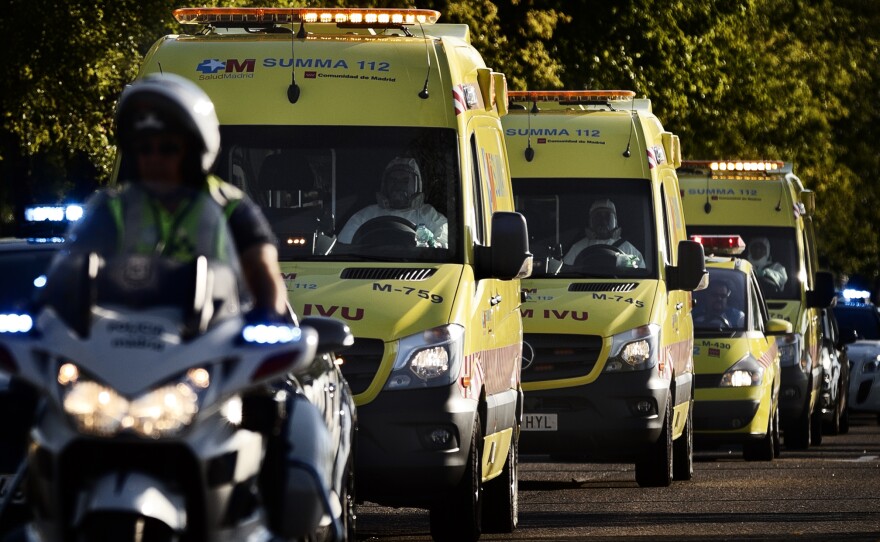In a development that raises a host of ethical issues, Spain announced it had obtained a scarce U.S.-made experimental Ebola drug to treat a Spanish missionary priest infected with the killer virus.
The Health Ministry statement came less than a week after the U.S. Centers for Disease Control and Prevention said there were virtually no doses available of the drug that was used to treat two Americans with the disease.
The drug's maker, Mapp Pharmaceutical Inc. of San Diego, says "very little of the drug is currently available" and that it is cooperating with government agencies to increase production as quickly as possible.
Nigerian officials say they had asked U.S. health authorities about getting the Ebola drug but were apparently not helped.
There is no known cure or licensed treatment for Ebola, which has killed over 960 people in the current outbreak in West Africa. The World Health Organization has called the Ebola outbreak - which emerged in Guinea in March and has since spread to Liberia, Sierra Leone and possibly Nigeria - an international health emergency and urged nations worldwide to battle the disease.
The ethical questions surrounding experimental Ebola drugs and vaccines were being debated Monday during a teleconference of medical ethicists and other experts organized by the U.N. health agency.
In a statement provided Monday, the Spanish Health Ministry said the ZMapp drug was obtained in Geneva this weekend with permission from the company and brought to Madrid to treat Miguel Pajares. The 75-year-old priest was evacuated from Liberia and placed in isolation Thursday at Madrid's Carlos III Hospital.
Two Americans diagnosed with Ebola in Liberia and evacuated back to the United States have been treated with the drug. One of them, Dr. Kent Brantly, said last week that his condition was improving and the husband of the aid worker being treated with Brantly said the same thing. Both are in isolation at an Atlanta hospital.
It was not exactly clear how Spain got the drug.
Spain said it obtained permission from the laboratory developing the drug and, under an agreement between WHO and the Doctors Without Borders charity group, imported the drug from Geneva where it said a dose had been available. The ministry said Spain sought the drug under legislation permitting use of unauthorized medication in patients suffering from a life-threatening illness who cannot be treated satisfactorily with any authorized drug.
WHO spokesman Gregory Hartl, however, told The Associated Press on Monday that the U.N. agency had no role in helping Spain obtain the experimental drug.
At least one country in West Africa has expressed interest in the Ebola drug. Nigeria's health minister, Onyenbuchi Chukwu, said last week he had asked U.S. health officials about access but was told the manufacturer would have to agree.
Dr. Tom Frieden, director of the U.S. Centers for Disease Control and Prevention, said "there are virtually no doses available," a CDC spokesman said last week.
Because the ZMapp drug has never been tested in humans, scientists say there's no way to tell if it has made any difference to the two American aid workers who have received it.
The drug is a mixture of three antibodies engineered to recognize Ebola and bind to infected cells so the immune system can kill them. Scientists culled antibodies from laboratory mice and ZMapp's maker now grows the antibodies in tobacco plants and then purifies them. It takes several months to even produce a modest amount of the drug.
In other Ebola developments:
- Nigerian health authorities confirmed another Ebola case Monday, a nurse who was treating Patrick Sawyer, the Liberian-American who flew into Nigeria with the disease and died of it last month. That brings the locally confirmed Ebola cases in Nigeria to 10, including two who have died, Sawyer and another nurse. Nigerian authorities now have Sawyer's 177 contacts under surveillance. WHO has not yet confirmed the Ebola cases in Nigeria.
- The hemorrhagic disease is ravaging some of the world's poorest countries, and their ill-equipped health systems have struggled to keep up. Liberia announced that a donation of protective gear from China was arriving Monday. A shortage of full-body suits and even clean surgical gloves has left health workers exposed to the virus and prompted some to refuse to treat Ebola patients.
- Residents in central Liberia rioted over the weekend, claiming the government had left some highly infectious bodies of Ebola victims in the streets for days without picking them up.
- George Weah, a former FIFA world player of the year from Liberia, has joined the efforts to spread awareness about the disease and how to prevent it. He is recording a song titled "Ebola is real," and proceeds are going to the Liberian Health Ministry.





